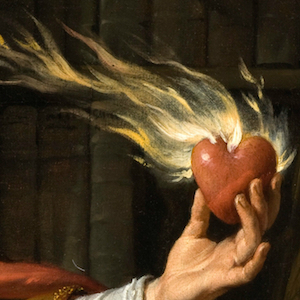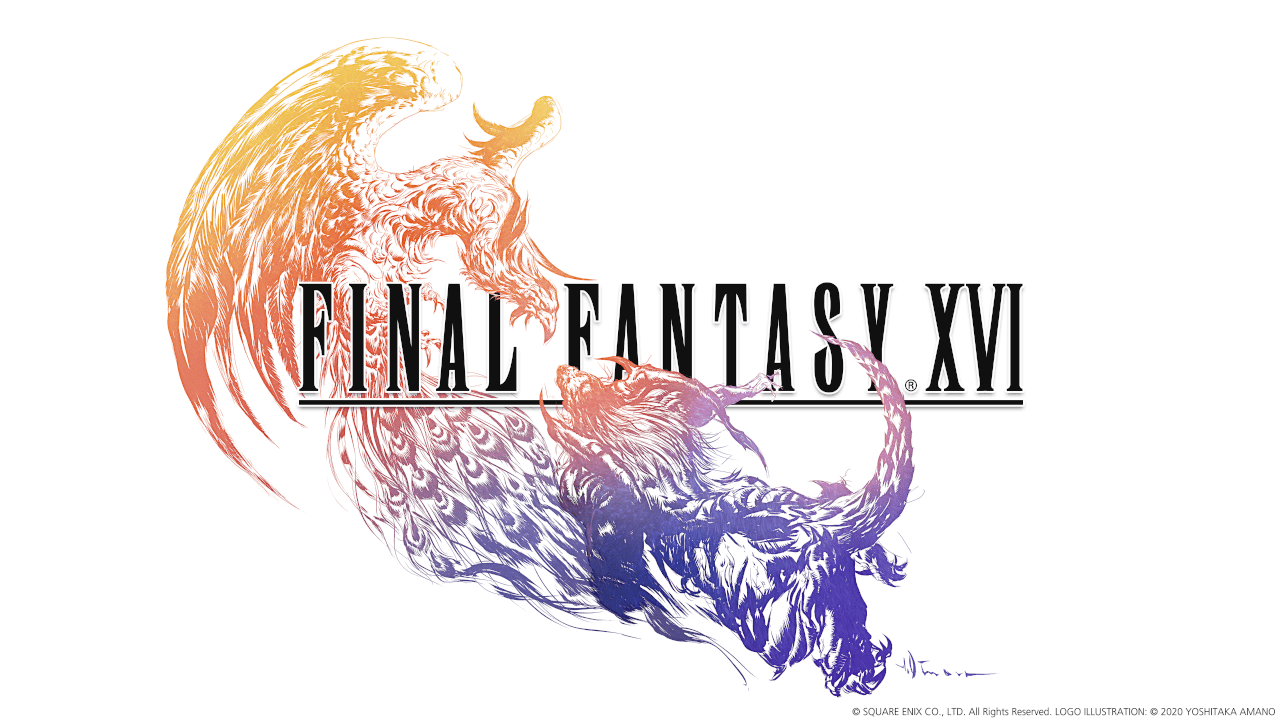
Titanic clashes between classic summons. A brutal, violent medieval world. Chocobo cavalry. Final Fantasy XVI‘s announcement trailer promised all three and more as part of the usual mix of old and new with the release of a mainline Final Fantasy title. While there would be a return to the traditional fantasy setting, it would be grimly rendered and contain more mature subject matter. Players would still be tasked with dispatching fan-favorite fiends, but this time in a fully-fledged action combat system. Crystals were back again – but this time as a negative influence.
Square Enix’s Creative Business Unit III delivered on those promises in June with Final Fantasy XVI‘s long-awaited official release. The tale takes place in the land of Valisthea, at once beset by a creeping blight slowly depriving it of life, and blessed with magic born from enormous “mothercrystals”. These mothercrystals are mined for fragments that are then distributed and used to power all manner of conveniences, but they are not the only sources of magic. Individuals known as “Bearers” also possess a minor innate magical capacity, and need no crystal fragment to weave spells. However, rather than being praised or feared, they are treated as no more than their crystalline counterparts, and are doomed to lives of slavery as means to magical ends. There are eight particular individuals known as the Dominants, however, who are bestowed with unique connections to the elemental Eikons. These Eikons are larger-than-life beings into which the Dominants can transform, and through whom have tremendous magical prowess.
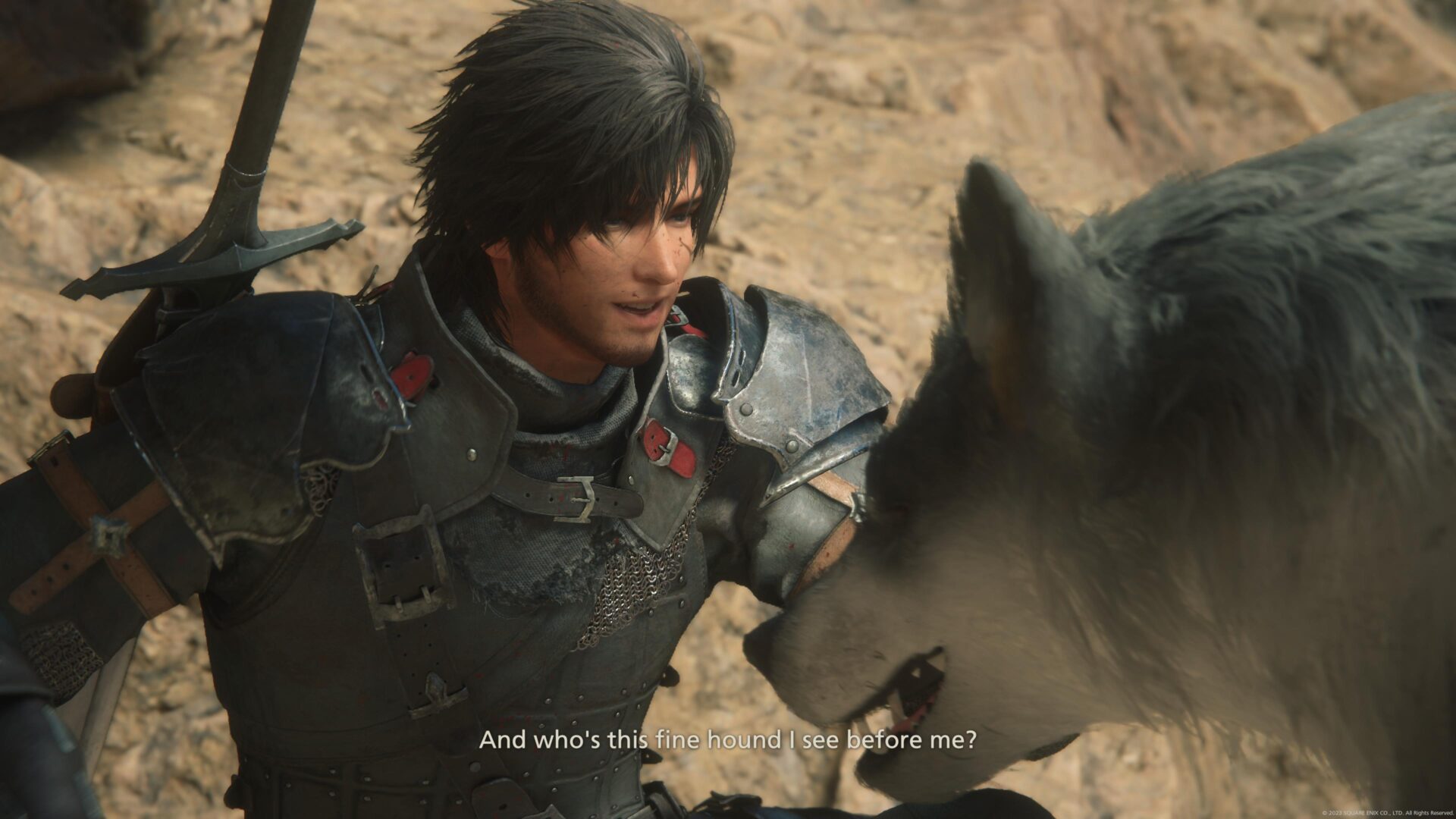
The royal line of the Duchy of Rosaria is connected to one such Eikon, the Phoenix, and the story centers on its current eldest son, Clive Rosfield. Given his nobility, he had been expected to inherit the powers of the Phoenix, but for inexplicable reasons those powers manifested in his younger brother, Joshua. While Clive’s mother resents the fact that he did not inherit the Phoenix, Clive takes it in stride out of love for his brother, and pledges to defend him as his Shield for as long as he lives. We meet Clive after a tragedy robs him of everything but a thirst for vengeance, and follow him on his quest for revenge.
Rest assured, the story eventually expands to a world-spanning scope, and that’s just one of the ways Final Fantasy XVI balances faithfulness to series traditions with new gameplay designs and visual presentation. It’s strikingly beautiful at every turn, and its combat is its greatest success. It’s also the case that everything outside of combat left me disappointed.
Let’s cover the good parts first, though. Final Fantasy XVI has sterling graphical fidelity and some remarkably impressive environments. The sense of scale, particularly when crystals are juxtaposed with various architectural forms, compels you to stop and marvel for a moment. That same sense of scale is also used to dramatic effect during battle, particularly during clashes between Eikons. Each clash is impressive enough on its own – but what’s perhaps a greater accomplishment is the fact that each one somehow tops the one before.
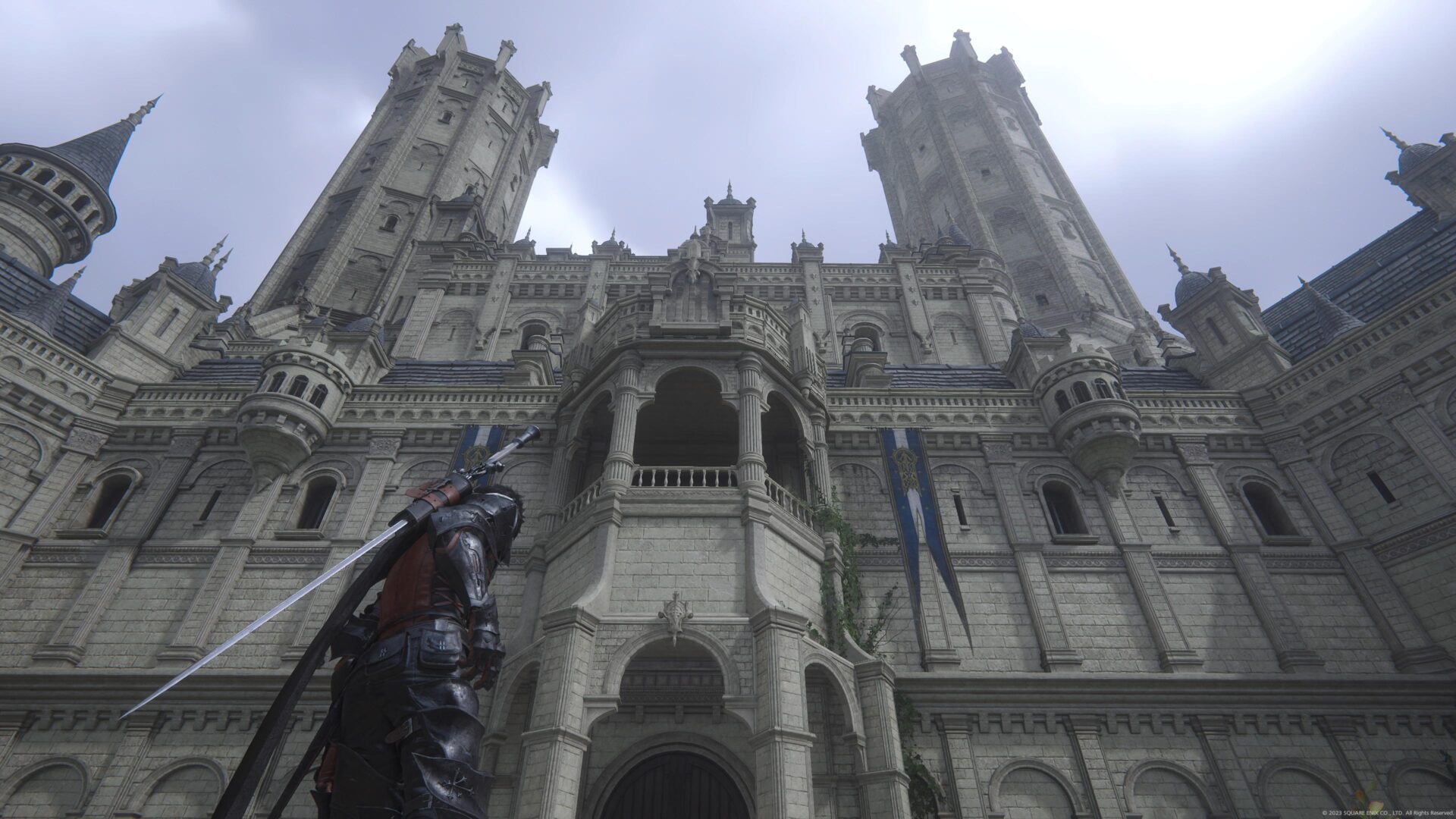
The character models’ appearances are somewhat mixed, in that their quality is directly proportional to how relevant the character is to the story. Clive and the other main cast members have a level of polish matching that of the environments, but some of the minor NPCs can look a little dated. It doesn’t ruin the experience by any stretch, but it’s enough that I think most people would notice. Regardless of their outward appearance, the characters are matched with top-notch voice acting across the board.
The music, too, is fantastic for almost the entirety of the game. There’s just one music track – and you’ll know it when you hear it – that was jarringly out-of-place, and ruined what should’ve been an epic moment. Other than that musical misstep, there’s a pleasant balance of introspective instrumentals for exploration and bombast for boss battles. The thoughtful piano-centric ambient tracks outside of combat are a soothing counterpoint to pieces like “Find the Flame”. That’s another great addition to the canon of Final Fantasy battle music, though I thought it was used a bit too early. With its driving rhythm and dramatic vocals, I found myself lacking the investment the music suggested I should’ve had during the first couple major fights.
Those fights are another high point for Final Fantasy XVI, and while it is dramatically different from the classic games, I think it’s fair to say it’s a natural evolution for the series. The introduction of the Active Time Battle system back in IV was an early incorporation of more real-time elements, and there’s a pretty clear march from turn-based team control to more active control over a single character between XI and XV. XVI just takes that next step, and fortunately does a mostly satisfying job.
Controlling Clive in combat requires mastery of a basic moveset including attack strings, charged attacks, lunges, dodges, parries, and magic attacks when you need to deal damage at range. These feats are augmented through the use of Eikon essences which grant a set of playstyle-influencing abilities unique to the given Eikon. You’ll quickly earn your first two, and eventually have six from which you can equip three at a time. There’s no MP or mana in this game, so you’re only tasked with managing these abilities’ cooldowns, and can swap between the Eikons in combat with the press of a button. Through battles and quest completion, you’ll earn Ability Points that can be spent to increase the potency of your Eikon abilities, and eventually master them such that they can, in general, be used with any Eikon.
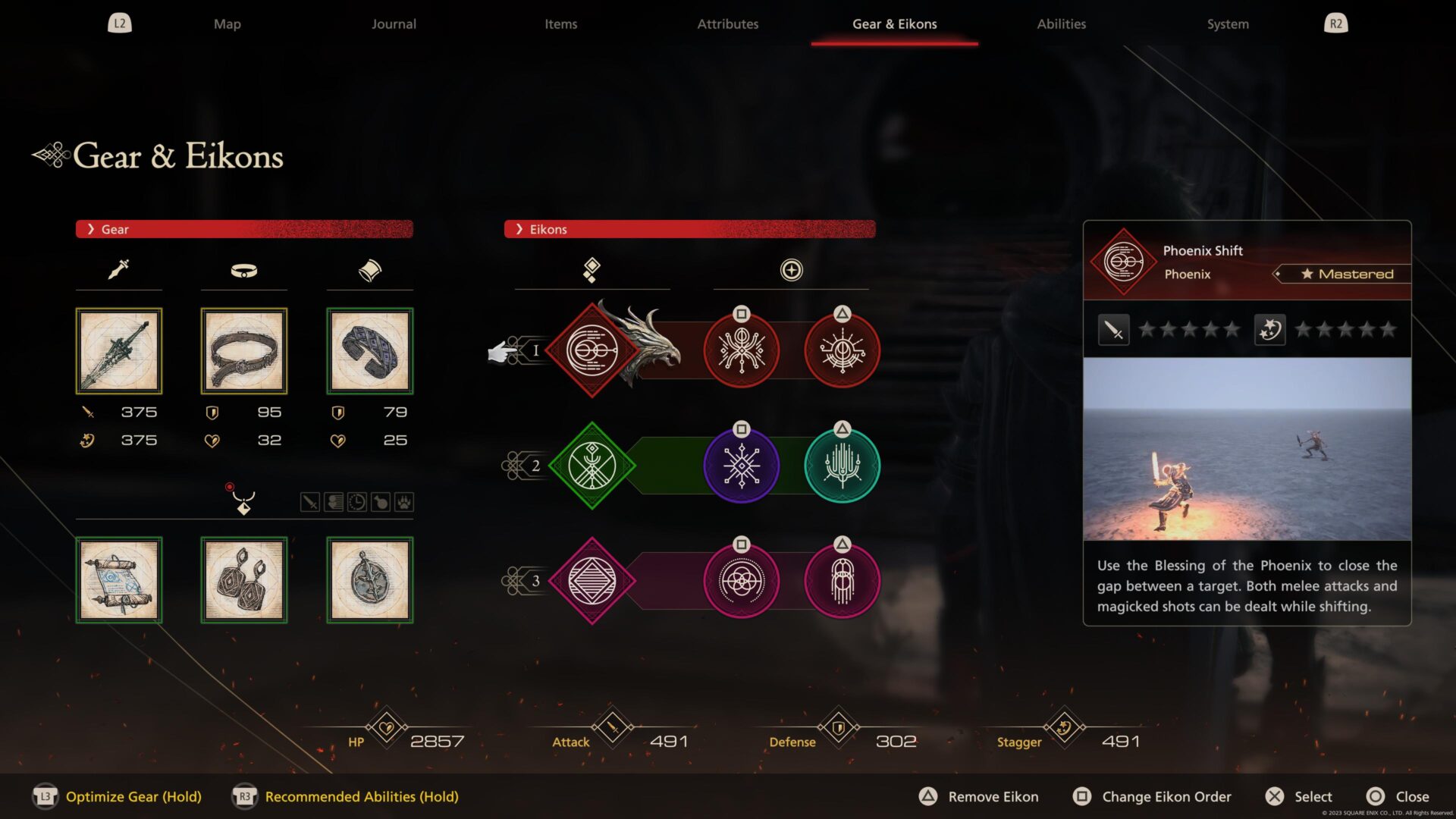
Selecting your Eikon abilities is about the extent of the customization you can expect in Final Fantasy XVI. There are only four statistics to manage: HP, Attack, Defense, and Stagger – and these will be influenced in straightforward ways by equipping newer and better swords, belts, and bracers. There are three accessory slots which offer more varied perks, often improving a specific Eikon ability, but I preferred more generally-applicable options since I wanted to experiment with all the available Eikons.
Combat encounters play out in a manner that’s likely become familiar to action game fans, but also echoes FFXIII‘s stagger mechanics. Most enemies have a Will gauge that, once depleted, leaves them temporarily incapacitated such that you can dish out massive damage with impunity. Your focus, then, becomes learning how to dodge your enemies’ attacks and find the openings necessary to break their will. This system hit a sweet-spot in terms of challenge for me. The boss fights have a sensibility that hearkens to classic Castlevania or Mega Man games, in which, once you learn the tells, you can defeat your enemies largely unscathed. (And when you fail, you’re usually seconds away from another attempt. To take a totally hypothetical and nonspecific example from another game, failure is not punished with a time-consuming jaunt through a trap-filled, multistory fortress, sidestepping the scimitars of surly snake-people. But I’m not bitter.)
Final Fantasy XVI‘s boss battles, particularly some of the optional bosses like Svarog, really shine and are experiences I’d gladly repeat. The trouble is, once you’ve mastered your combo timing and get a groove with your preferred Eikons, regular combat drifts towards the tedious…and unfortunately I think it’s fair to use that word to describe most of the game outside of combat.
While the main narrative has the momentum necessary to carry you through the game, it often forces you to perform repetitive fetch quests – and if you want to get the best gear, get ready for more. It’s not as if that’s a new concept to Final Fantasy or JRPGs generally, but these are designed such that there’s nothing rewarding about the journey itself. There’s no challenge in identifying where to go, you won’t really see unique areas – certainly not on par with the spectacles of the main quest, nor will you see relationships deepen between your characters. It’s actually startling sometimes the extent to which your party intentionally travels separately to serve the mechanical needs of the game.
Without any means of interacting with the world beyond combat, I reached a point where I was basically just dragging myself between the cinematic dialogue and major fights. An argument could be made that the classic Final Fantasy games share in this problem – in the old days you were walking and grinding out random encounters between the boss battles to progress the story. However, you also didn’t have an ever present quest marker, and were challenged to think in ways beyond just how to succeed in combat.
My lack of patience with Final Fantasy XVI undoubtedly has to do with my frustrations with the story, but unfortunately I can’t go into great detail without major spoilers. (Details with said spoilers are below in the Moral/Spiritual Value section.) Suffice to say, meaningful character interaction in Final Fantasy XVI is limited to the cutscenes, and even then there’s a noticeable lack of the interpersonal party dynamics you may have come to expect out of a Final Fantasy. There are some moving moments, but they’re couched in a story that’s difficult to read as anything other than depressingly nihilistic. To be sure, Final Fantasy XVI tries to cast its conclusion in a positive light, but it’s extinguished by an examination of the logic of its themes. That’s not to say there was nothing positive about the story – the villain was certainly diabolical and worthy of defeat…it’s just that the protagonists have shallow and insufficiently considered reasons for wanting to do so. There is one character who occasionally asks the right questions, and points to flaws in Clive’s assumptions – but Clive sticks to his flimsy mantra no matter what. He might sound cool when he repeats it, but that doesn’t make it any less self-defeating.
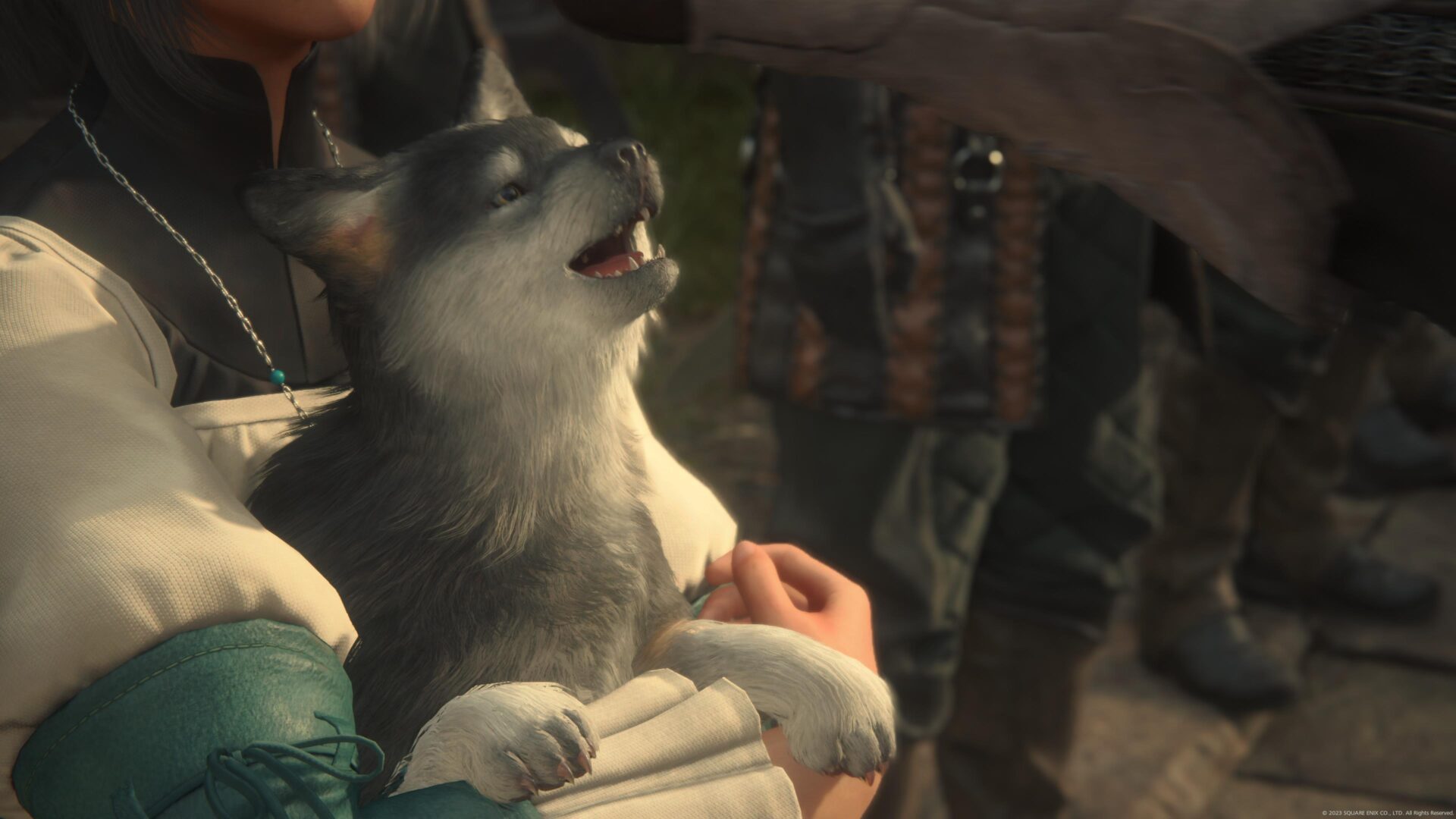
Overall Recommendations
In summary, Final Fantasy XVI certainly impresses with its gorgeous visuals and satisfying combat, but it left me feeling hollow. The new battle system was fluid and fun, but came at the expense of many other elements that make a Final Fantasy worth playing. I can certainly recommend the game to a suitably mature series fan wanting to stay up to date, but even then I’d have a hard time saying you need to rush. (Plus, Stranger of Paradise has an action-RPG take on Final Fantasy with more mechanical depth.) To anyone else, I’d say play God of War (2018) and God of War: Ragnarok first. Sure, they don’t go full-anime in some of their set piece battles, but basically everything Final Fantasy XVI does well, those games do as well or better in addition to having more varied gameplay experiences.
Parental Warnings
This is definitely not a game for kids, and unfortunately it’s also one I couldn’t trust to let my kids see even in passing. Final Fantasy XVI is interested in exploring its M rating, but does so with an immature maturity.
Suggestive Themes: There are suggestive and passionate embraces, bawdy talk, and a surprising amount of hanging around brothels (though the activities therein are not depicted). While you do not see any characters actually engaging in sexual activity, there are times where it’s clear you are seeing them immediately before or after. In those moments the characters are basically nude, though the game goes to Austin Powers-level effort to conceal the most sensitive regions. Two men also kiss at some length, though the story-relevant one of the two is not written such that he becomes a caricature, nor is that behavior glorified or dwelt upon beyond that moment.
Violence: It’s bloody action combat that displays the brutality of the fighting involved. I don’t recall anything excessively gory, but there are definitely some grim/gruesome story moments.
Language: There’s a comically excessive overuse of F-bombs, and they almost always come off as incongruous to the situations in which they are used. I can handle a certain amount of verbal vulgarity, but I’d prefer it with a side of creativity.
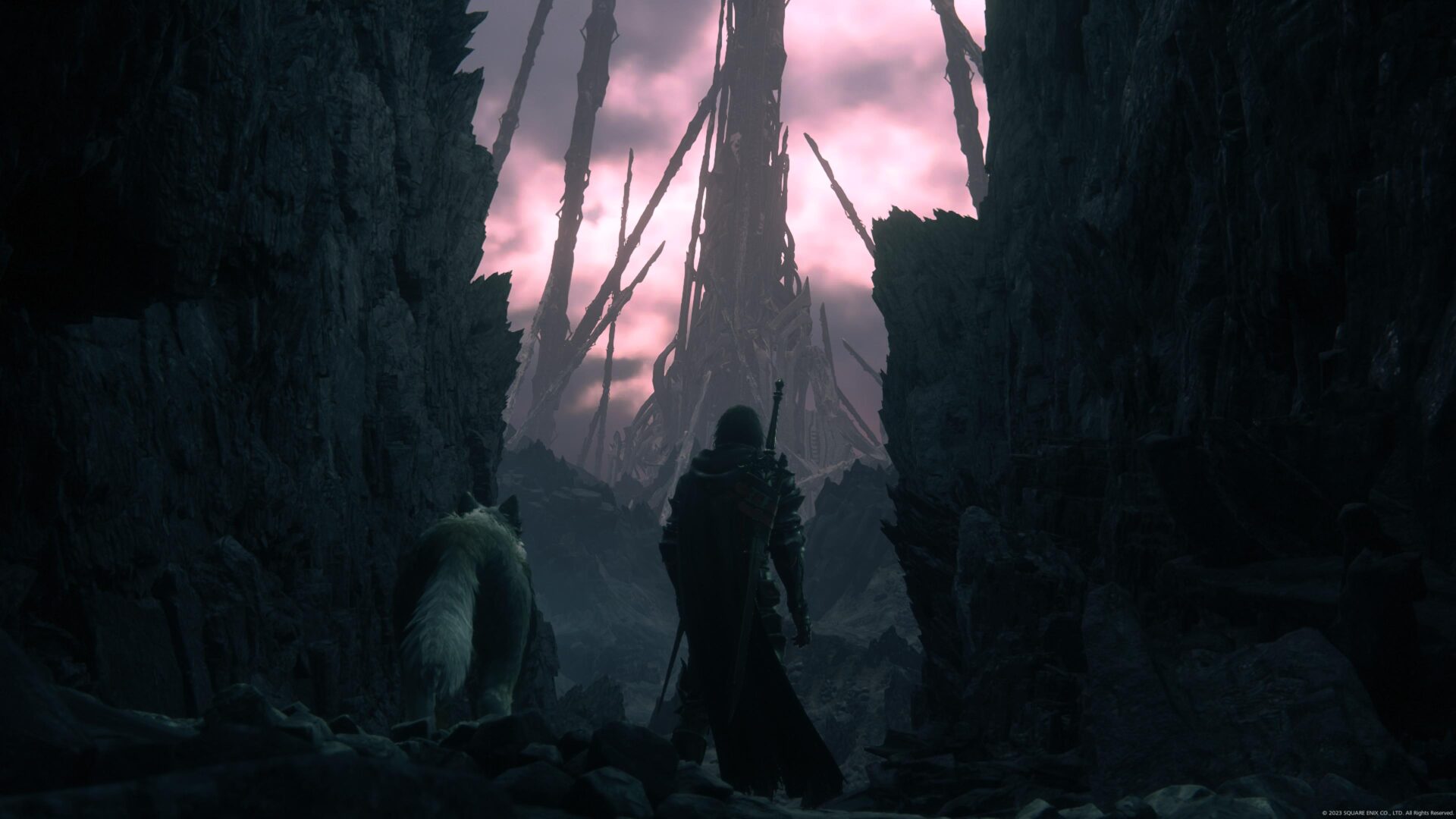
Moral/Spiritual Value
Final Fantasy XVI is not entirely without positive ideas, nor is its major flaw a principal villain claiming divinity. Defeating false gods seems like a decent way for heroes to pass their time. (Indeed, in Kings, the good ones are measured by the extent to which they destroyed idols and their places of worship.) Instead, the flaw in Final Fantasy XVI‘s core philosophy is a fundamental misunderstanding of what it means to participate in the divine. That error leads to heroes motivated by a paper-thin philosophy which is self-defeating, undercut by the events of the game, and just unsatisfying.
The Big Bad this time around, Ultima, fancies himself a god. As it turns out, he’s an ancient being from a destroyed world with a two-pronged plan to refashion Valisthea into his homeworld. It’s Ultima who plants the mothercrystals on Valisthea to absorb its magical energy, and it’s Ultima who creates the humans there in a sort of biological algorithm to eventually produce a fitting vessel for his will.
Since he lacks a body when the story demands it, Ultima bends humans to his will to achieve various intermediate material goals. He prepares them for thralldom through division and accusation – he specifically wants to separate targets from their loved ones, and drive them into despair in the face of their sins or failures, as that makes them more pliable. It’s to FFXVI‘s credit that Ultima is so truly diabolical. The devil does indeed want us to feel alone and worthless, as that despair will keep us from seeking the abundant mercy of our Loving Father.
Final Fantasy XVI never tries to render Ultima as redeemable or divine, but it unfortunately also takes it as given that any participation in the will of a transcendent being necessarily obliterates our free will as humans. Not a single character ever articulates an argument against the counterfeit god or his lackeys based on something actually transcendent. The highest good the game imagines is that humans get to define for themselves what is good as opposed to it being defined by a more powerful being. We’re left with the repetition that the heroes just want to live “on [their] own terms”. Sorry, Clive, but the steeliest gaze and gravelliest brogue can’t keep that from being pablum. You’ve got to define what those terms are.
Live “on our own terms”? How is that different from what Ultima’s trying to do? How is that different from what the Sanbrequoi emperor was doing – quite literally, as he nullified the terms of any treaty he deemed an impediment to his aims that day? If all we’re doing is fighting over our terms versus someone else’s, then we’re in a perpetual contest of might-makes-right.
The only way humans could break that cycle is by uniting under something truly transcendent to them. In other words, humans would have to participate in something beyond themselves. That really ought not be such a controversial claim. Two people conversing have to obey the rules of their language in order to communicate. Musicians must follow the score and perhaps even the will of a conductor in order to play properly. It is through their obedience to something outside themselves that they are free to act, and so it is with us and God. Sadly, the characters in Final Fantasy XVI do not share that belief…maybe with the exception of Joshua.
As the game nears its conclusion, Joshua suggests that victory could lead to a godless world where their newfound freedom would be a new chain. Surprisingly, this is where the ostensibly godless Clive makes a faith-based claim. He says chains can be broken with sufficient will, so things’ll get better…eventually. I’d argue Joshua’s right, not because the humans need Ultima, but because humans need God. The world Clive envisions may have earned a little more time by foiling Ultima’s destructive plans, but it wouldn’t be fundamentally improved. He’s resigned to the fact that competing visions of the good will always and only be adjudicated through violence, and that’s not a world I’m all that interested in fighting for.
